ACUE’s Effective Online Teaching Practices Syllabus
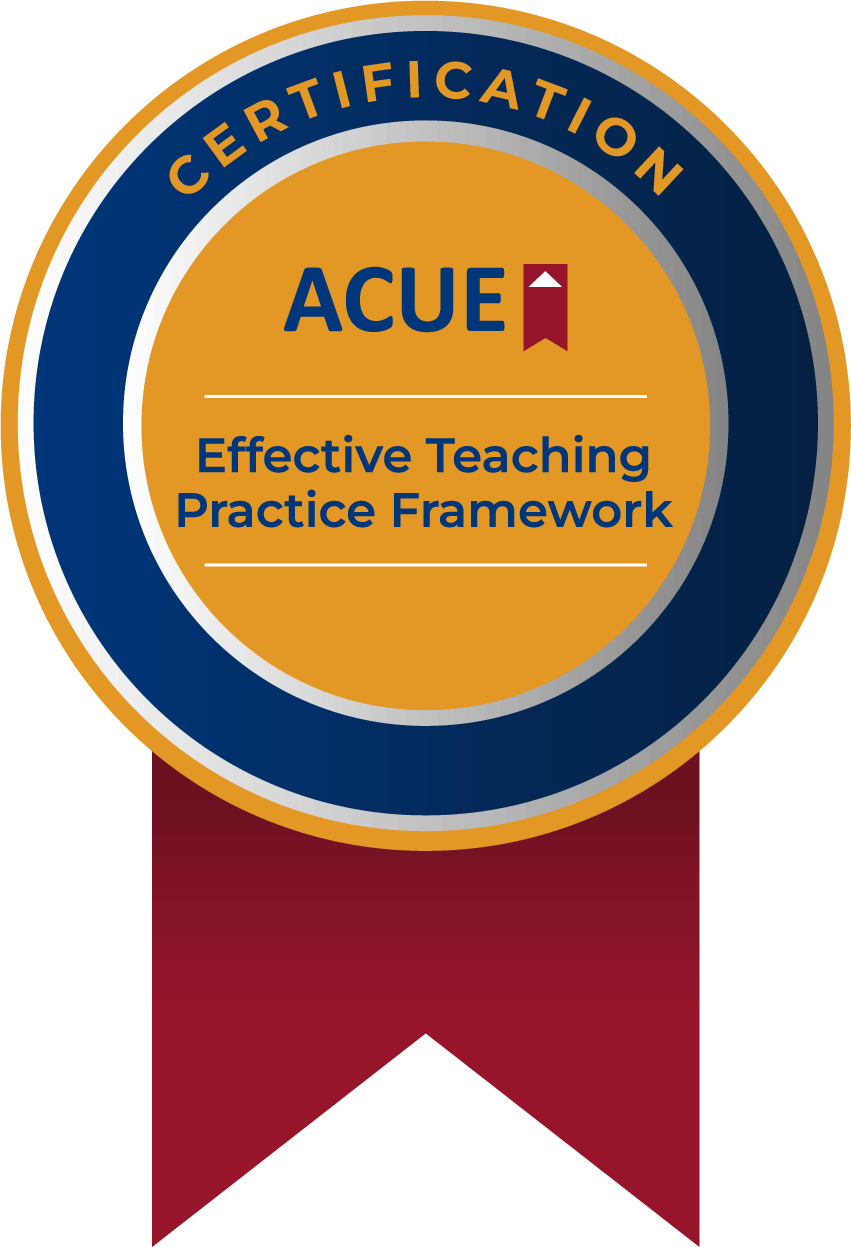
Welcome
Welcome to your ACUE course. Consider this a mini graduate course in which you will dedicate at least 2–3 hours per week engaging with the material, implementing teaching practices in your classes, and composing a written reflection. Each module provides you with various research-based practices to implement in your course. Among these, you will select and implement the practice(s) that best suits your instructional goals and your students. The ACUE course is also community-based, and you will have many opportunities to learn from and share ideas with your colleagues about the teaching practices you are learning. Your instructor will guide you through the modules; help to create an environment where questions, conversation, and learning are valued; and provide you with ideas and feedback.
Instructor Corner
Some of the ways your instructor provides guidance and encouragement are by:
- sharing pedagogical insights
- leading and contributing to discussions
- posting announcements
Course Overview
Depending on the course, you will complete 6–7 modules. As you engage with each module, you will view videos of effective teaching practices in the online environment featuring faculty and students from a wide variety of colleges and universities, as well as experts in the field of teaching and learning. A set of resources designed to help you implement practices and deepen your learning is vailable, and you will have opportunities to participate in thought-provoking discussions to learn with and from your colleagues. Finally, you will reflect and write about your experiences implementing new teaching practices. Your reflections will be reviewed by an ACUE National Reader.
Complete the following to earn a badge for each module:
- Engage with module content.
- Implement a teaching practice.
- Write a reflection of the experience.
- Complete the Practice & Reflect II survey.

Module Components
The following table provides a description of the module components.
You will learn more about the components when you watch ACUE’s Learning Design video below and in the Start Here module of your course.
| Module Component | Description |
|---|---|
| Introduction | Piques your interest and gets you thinking about and relating to the module topics |
| Learning Objectives | States what you will learn as well as the practices you can choose to implement |
| Pause & Plan I & II | Pause & Plan I provides you with the opportunity to think about how the objectives and practices could be implemented in your course. In Pause & Plan II, you select the practice or practices you will be implementing in your course and download implementation guides. |
| Course Demonstration | Shows the effective practices recommended in the module being implemented by instructors from across the country in the learning environment |
| Expert Insights | Delves deeper into some of the module’s practices with further explanations, supporting research, and commentary by nationally recognized experts in the field |
| Common Challenges & Misconceptions | Provides research-based clarifications and suggestions for addressing common challenges and misconceptions |
| Observe & Analyze | Showcases practices with different levels of proficiency and provides an opportunity to discuss the module practices more deeply with your colleagues |
| Practice & Reflect I | Serves as the culminating activity where you implement a research-based practice that you learned in the module and then reflect upon it |
| Practice & Reflect II | Provides an opportunity to think about what you learned, what you implemented, and what you may implement in the future |
| Note to Future Self | Provides the opportunity for you to write a “note to your future self” that will appear on your What’s Next Report after completing the course |
| Implementation Resources | Provides step-by-step guidance, course resources, and examples designed to help you implement module practices; resources are downloadable |
| References | Provides a list of faculty and experts featured in the module and a list of sources used for module content |

Course Learning Objectives
Completing a pathway course provides you with the following opportunities:
- Implement evidence-based teaching practices that promote student engagement and learning.
- Reflect on and refine teaching practices.
- Engage with peers about teaching practices, successes, and challenges.

ACUE’s Pathway Courses
You are enrolled in one of ACUE’s courses in Effective Online Teaching Practices. You are not required to take the courses sequentially to earn a certification in ACUE’s Framework. Each module aligns with a teaching competency in ACUE’s Effective Teaching Practice Framework. The framework is a leading statement of the instructional skills that every college educator should possess.
Creating an Inclusive and Supportive Online Learning Environment
Promoting Active Learning Online
- Welcoming Students to Online Learning
- Promoting Civil Online Learning Environments
- Ensuring Equitable Access to Online Learning
- Helping Students Persist in Online Learning
- Embracing Diversity in Online Learning
- Checking for Student Understanding in Online Learning
- Providing Useful Feedback for Online Learning
- Developing Effective Modules and Microlectures
- Teaching Powerful Note-Taking Online
- Using Groups to Ensure Active Online Learning
- Using the Active Learning Cycle in Online Courses
- Planning Effective Online Discussions
- Facilitating Engaging Online Discussions
Inspiring Inquiry and Lifelong Learning in Your Online Course
Designing Learner-Centered and Equitable Courses
- Motivating Students Online
- Providing Clear Directions and Explanations In Online Courses
- Integrating Visual Tools in Online Courses
- Using Data and Feedback to Improve Online Teaching
- Using Advanced Questioning in Online Courses
- Developing Self-Directed Online Learners
- Ensuring Learner-Centered Course Outcomes
- Designing Aligned Assessments and Assignments
- Aligning Learning Experiences with Course Outcomes
- Creating Equity with Checklist and Rubrics
- Developing Equitable Grading Practices
- Preparing an Inclusive Syllabus
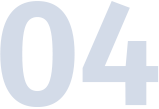
The Power of Reflection
ACUE’s model is grounded in the evidence-based process of becoming reflective practitioners. At its core, it is a community-based faculty engagement process that involves learning about, applying, reflecting on, and adjusting the use of evidence-based teaching practices. Faculty who invest fully in the reflective process are most successful at transforming their teaching, thereby impacting student outcomes.

“The only way you’re going to learn a new teaching practice is to do it. You have to apply what you’ve learned . . . then reflect on what worked well, what needs tweaking in the future, what [you’ve] missed, what students appreciate about it . . .”—Stephen Brookfield
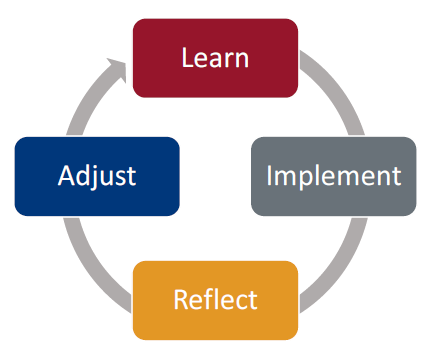
This below video, featuring ACUE certified educators, reinforces ACUE’s model and Brookfield’s statement by addressing the importance of implementation.
“Without reflection, how do I begin to know how well I am doing? Reflecting critically on what I do in the classroom slows the clock and allows me to carefully consider my current and future teaching actions and behaviors. Critical reflection is a tool for college faculty to use and alter their teaching practice in powerfully beneficial ways.”—Catherine Haras, Senior Director of the Center for Effective Teaching and Learning (CETL) at California State University, Los Angeles,

Assignment Types & Reflection Guide
Each module presents a variety of teaching practices and two reflection assignment types, Implementation or Plan to Implement. Prior to implementing a teaching practice, you should review the rubric and download the Reflection Guide for the selected assignment type, Implementation or Plan to Implement. The Reflection Guide is a Microsoft Word document that you will use to type your reflection assignment and upload as your Practice & Reflect I: Reflection Assignment submission. Using the Reflection Guide is the best way to ensure that all rubric requirements are met.
Although most modules require implementation of an evidence-based practice with your students, in rare instances, we realize that you may not be able to implement a practice within the time frame of the course. With this in mind, you may submit up to one Plan to Implement reflection assignment in each Pathway Course. If you enrolled in the comprehensive course (25 modules), you may submit up to five Plan to Implement reflection assignments.
Example: Implementation Reflection Guide
| Criteria | Scoring guide | Your reflection |
|---|---|---|
| What practice(s) did you implement? | Meets: Identify the practice(s) and either explain why you selected them or thoroughly describe the steps taken to implement them | |
| Exceeds: Add both an explanation of why you selected the practice(s) and thoroughly describe the steps taken to implement the practice(s) | Optional | |
| How did your use of the practice(s) impact your students or your teaching? | Meets: Share how your use of the practice(s) impacted your students or your teaching | |
| Exceeds: Share why this impact took place | Optional | |
| What other steps will you take to continue to refine your use of the practices shared in this module? | Meets: Specify how this or other practices from the module will be used or adjusted for the future | |
| Exceeds: Explain why these steps will be taken | Optional |
“If you want to build a ship, don’t drum up people to collect wood and don’t assign them tasks and work, but rather teach them to long for the endless immensity of the sea.”—Antoine de Saint-Exupéry

Summary Discussion
After the final module in the course, your cohort will participate in a summary discussion which allows you additional opportunities to learn from your colleagues. This is the ideal time to share your teaching practices, discuss how your students responded to the teaching practices, and solicit feedback from your colleagues. The content in the course is enhanced greatly by the interactions you have with your cohort colleagues.
The summary discussions may take place in one of three ways:
- as a live virtual event offered through a web-conferencing tool
- in your ACUE Canvas course on a discussion forum
- as a face-to-face event on your campus led by your instructor

Community Building
Although this course takes place online, community building is an important component for meeting our course objectives. To ensure a productive and collegial learning experience for all course-takers, we need everyone to do their best to engage in the following behaviors:
- Actively participate. The course experience is more enriching when it includes a greater number of diverse voices and perspectives.
- Read and respond to Observe & Analyze discussion threads. Research shows that learning is enhanced when online discussion participants read each other’s posts, engage in meaningful collaboration, offer encouragement, and share relevant resources.
- Demonstrate respect for differences. We all come to the table with different experiences and viewpoints. In order to get the most out of this learning opportunity, show respect for differences by seeking to understand, asking questions, clarifying understanding, and/or respectfully explaining your own perspective.
- Be timely. We ask that you do your best to stay on the same schedule as your cohort to maximize learning for all course-takers.
- Be specific. We encourage you to offer specific evidence from the videos or your own course experiences when posting to the discussion forums.
- Use an appropriate tone and language. In online environments without verbal or physical cues, humor and sarcasm can be mistaken as cold or insulting. Please pay special attention to your tone and language use before submitting discussion posts and contributing to the conversation.
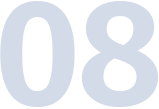
Set Your Goals
Take a moment as you begin this journey to consider your goals for taking this course. The course is not graded, but there are minimum requirements for earning the course badge. Like all endeavors, the levels of growth, personal satisfaction, and impact resulting from engaging in the course are tied directly to your level of effort. Instructors take this course for a variety of reasons. Here are some common reasons course-takers have shared:

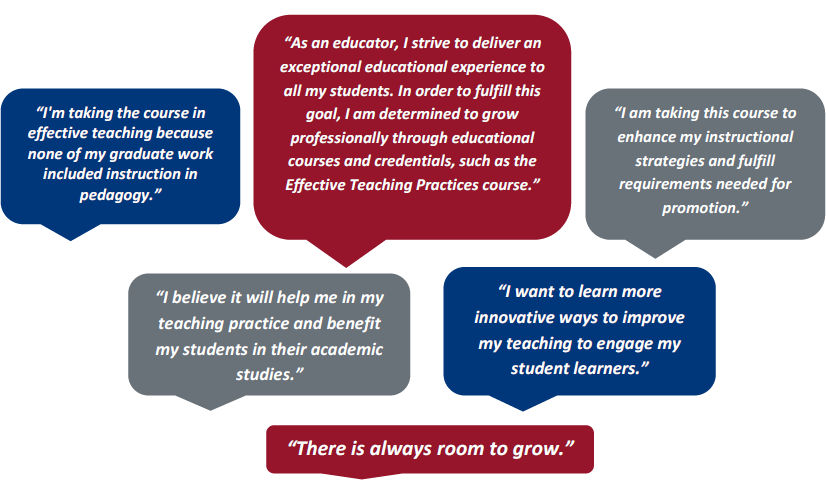
“I am not a teacher, but an awakener.”—Robert Frost

How to Be Successful in This Course
The first step in being successful in an ACUE course is to start strong. Consider the goals you have for engaging in this course as you determine how to allocate time to complete course requirements. Like most of our roles, there are deadlines we must meet, and in ACUE courses it is a requirement to complete the Start Here module before the drop date, which is two weeks after the course start date.
Faculty surveyed who have earned a certification in ACUE’s Framework indicated it takes on average 2–3 hours to successfully complete each module. The Module Time chart below provides a visual representation of the typical time spent completing a module, followed by an example weekly schedule.
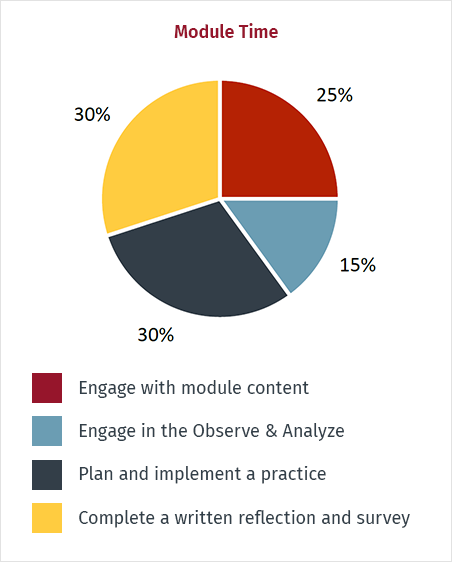
Example Weekly Schedule
| Day | Task |
|---|---|
| Monday–Tuesday (or get a jump start over the weekend) |
|
| Tuesday–Wednesday |
|
| Thursday–Friday |
|
| Friday–Sunday |
|
Life Happens
Due dates for every module are provided on the course schedule and posted in Canvas. However, we recognize that sometimes things come up, such as conferences, new committee assignments, and personal events. Or sometimes it is necessary to wait an extra week to implement a strategy effectively. In these instances, we recommend you contact your course instructor to let them know that you will submit module work after the due date.

Course Resources
| Resource | Description |
|---|---|
| Course Guide | Provides a comprehensive list of answers to frequently asked questions, implementation planning guides, and information about ACUE; located in your ACUE Canvas as part of the course’s navigation menu |
| Course Instructor | Serves as the guide and mentor, assisting course-takers as they learn about, implement, and reflect on teaching practices |
| ACUE Technical Support | Provides technical support at support@acue.org |
| ACUE Reader | Scores Practice & Reflect I written reflections using a scoring guide; scores reflection within three business days after module due date |
| ACUE Academic Director | Collaborates with course instructor to encourage implementation and ensure course-taker success |
| ACUE Content Feedback | Provides opportunity to send content-related suggestions and concerns to the team responsible for creating ACUE courses at coursecontent@acue.org |
| Community of Professional Practice | Serves to sustain the development and application of research-based teaching practices during the course and after its completion |
“What we learn with pleasure we never forget.”—Alfred Mercier
Course Schedule
Each module’s start and due date is located on the course
schedule that can be found on the Syllabus page in Canvas.